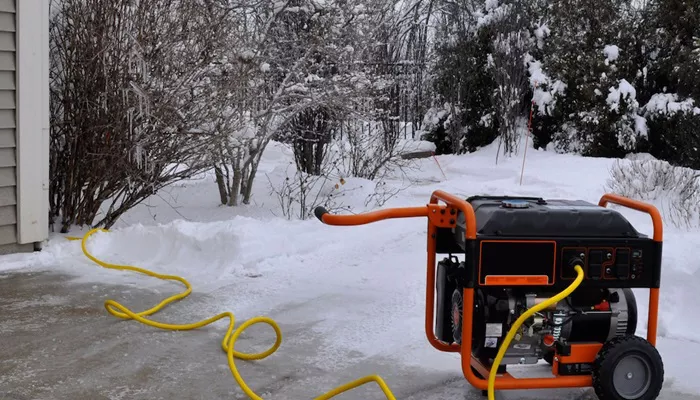Portable generators are essential for homeowners who want to ensure uninterrupted power during outages or need a reliable power source for outdoor activities. In this article, we’ll explore the best-rated portable generators for home use in 2025. We’ll provide detailed descriptions, highlight key features, and offer tips to help you make an informed decision.
Why You Need a Portable Generator for Your Home
Power outages can happen at any time due to storms, grid failures, or other unforeseen events. A portable generator ensures that your home remains powered, keeping your lights on, appliances running, and devices charged. Additionally, portable generators are versatile and can be used for camping, tailgating, and other outdoor activities.
Key Features to Consider When Buying a Portable Generator
When choosing a portable generator, consider the following key features:
Power Output: Measured in watts, this determines how many appliances and devices the generator can power simultaneously.
Fuel Type: Generators can run on gasoline, propane, or diesel. Each fuel type has its pros and cons.
Run Time: This indicates how long the generator can operate on a full tank of fuel.
Portability: Look for generators with wheels and handles for easy transport.
Noise Level: Measured in decibels (dB), lower noise levels are preferable, especially for residential areas.
Safety Features: Look for features like automatic shut-off, circuit breakers, and low-oil shutdown.
Top 5 Best-Rated Portable Generators for Home Use
1. Honda EU2200i
Key Features:
Power Output: 2200 watts
Fuel Type: Gasoline
Run Time: Up to 8.1 hours on a single tank
Noise Level: 48-57 dB
Weight: 47 pounds
Pros:
- Extremely quiet operation
- Fuel-efficient
- Reliable and durable
Cons:
- Higher price point
- Limited power output for larger homes
Why We Recommend It:
The Honda EU2200i is known for its reliability and quiet operation, making it an excellent choice for homeowners who need a dependable power source without the noise.
2. Champion 3800-Watt Dual Fuel
Key Features:
Power Output: 3800 watts
Fuel Type: Gasoline or propane
Run Time: Up to 9 hours on gasoline, 10.5 hours on propane
Noise Level: 68 dB
Weight: 119 pounds
Pros:
- Dual fuel capability
- Electric start
- Affordable price
Cons:
- Heavier than other models
- Louder operation
Why We Recommend It:
The Champion 3800-Watt Dual Fuel generator offers versatility with its dual fuel capability, making it a great option for those who want flexibility in fuel choice.
3. Westinghouse WGen7500
Key Features:
Power Output: 7500 watts
Fuel Type: Gasoline
Run Time: Up to 16 hours on a single tank
Noise Level: 72 dB
Weight: 192 pounds
Pros:
- High power output
- Long run time
- Remote start feature
Cons:
- Heavy and bulky
- Higher noise level
Why We Recommend It:
The Westinghouse WGen7500 is ideal for larger homes that require a high power output and long run time, ensuring that all essential appliances remain powered during an outage.
4. Generac GP3000i
Key Features:
Power Output: 3000 watts
Fuel Type: Gasoline
Run Time: Up to 5.7 hours on a single tank
Noise Level: 58 dB
Weight: 59.5 pounds
Pros:
- Lightweight and portable
- Quiet operation
- Affordable price
Cons:
- Shorter run time
- Limited power output
Why We Recommend It:
The Generac GP3000i is a lightweight and affordable option for homeowners who need a portable generator for basic power needs.
5. DuroMax XP12000EH
Key Features:
Power Output: 12000 watts
Fuel Type: Gasoline or propane
Run Time: Up to 8 hours on gasoline, 6 hours on propane
Noise Level: 74 dB
Weight: 260 pounds
Pros:
- High power output
- Dual fuel capability
- Electric start
Cons:
- Very heavy
- Higher noise level
Why We Recommend It:
The DuroMax XP12000EH is a powerhouse generator suitable for large homes and heavy-duty applications, offering both high power output and dual fuel capability.
How to Choose the Right Portable Generator for Your Home
Choosing the right portable generator depends on your specific needs.
Consider the following factors:
Power Requirements: Calculate the total wattage of the appliances and devices you need to power. Choose a generator with a power output that meets or exceeds this total.
Fuel Type: Decide whether you prefer gasoline, propane, or diesel. Each fuel type has its advantages and disadvantages.
Portability: If you need to move the generator frequently, opt for a lighter model with wheels and handles.
Noise Level: If noise is a concern, choose a generator with a lower decibel rating.
Budget: Determine your budget and find a generator that offers the best features within your price range.
Safety Tips for Using Portable Generators
Using a portable generator safely is crucial to prevent accidents and ensure longevity.
Follow these safety tips:
Proper Ventilation: Always operate the generator outdoors in a well-ventilated area to avoid carbon monoxide poisoning.
Regular Maintenance: Perform regular maintenance, such as oil changes and air filter replacements, to keep the generator in good condition.
Correct Fuel Storage: Store fuel in approved containers and away from living areas.
Avoid Overloading: Do not exceed the generator’s power output to prevent damage and potential hazards.
Use a Transfer Switch: When connecting the generator to your home’s electrical system, use a transfer switch to avoid backfeeding, which can be dangerous.
Conclusion
Investing in a portable generator is a smart decision for any homeowner. It provides peace of mind during power outages and offers versatility for various outdoor activities. By considering the key features, safety tips, and our top recommendations, you can find the best-rated portable generator for your home. Whether you need a quiet and efficient model like the Honda EU2200i or a powerful option like the DuroMax XP12000EH, there’s a generator out there to meet your needs.
Related topic:
- 3 Best Generators for Off-Grid Homes
- 5 Best Home Emergency Power Generators
- 5 Top Affordable Home Generators

